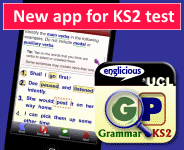09: Linking (2)
This is Lesson #9 of a unit of 10.
Teacher Slide
Objective: grammar
To understand how we can link clauses using subordination.
Objective: writing
To encourage pupils to join clauses in their writing using when, because, after, before, since, etc.
Terminology for pupils:
There is no new terminology for this lesson, although pupils will be required to draw on existing knowledge from previous lessons.
Let's look at some sentences.
- We stayed inside because it was raining.
- Before we left, we checked our bags.
- When we go out, we’ll get some snacks.
- We’ll go to the park if it is nice weather.
Why do we use words like because, before, when and if?
Can you swap each highlighted word with another word, so that the meaning is changed?
For example, We stayed inside when it was raining.
What do you remember about the linking words and, or and but from the previous lesson?
This lesson also looks at linking words, but a different type. We will look at linking words that give readers extra information about why something happened (using because), or when it happened (using while, when, after, before, etc.), or when there is a condition (using if).
For example, the linking word because is used to give a reason for something:
- We are happy because it is Friday afternoon.
Activity
Answers
Linking words such as after, while, because, so and if all introduce information which is:
- optional: if we remove it, then the sentence will still make sense. For example, you can say I’m leaving because it is late, but also leave out the reason: I'm leaving.
- moveable: it can be moved around in the sentence. For example, you can say I’m leaving because it is late, but also Because it is late, I’m leaving.
Let's check this with our earlier sentences. Here they are again with a different word order:
- Because it was raining, we stayed inside.
- We checked our bags, before we left.
- We’ll get some snacks, when we go out.
- If it is nice weather, we’ll go to the park.
Linking words are important in writing because they mean that we can join ideas, and give our readers extra information. Let's look at an example:
- They climbed the mountain after they had lunch.
- Which is the linking word?
- What information does the linking word introduce?
- Could the linking word (together with what comes after it) be removed? What is the effect when you do this?
- Could the linking word (together with what comes after it) be moved? What is the effect when you do this?
We use linking words and the parts of the sentence they introduce to give extra information, and tell our readers about the reason something happened or when something happened.
Here are some incomplete sentences. Each is introduced by a linking word.
Your job is to make a complete sentence. One example has been done for you.
- While we were eating ...
... the doorbell rang
Now can you try to finish these sentences?
- If you ever look inside that room ...
- While she looked into the mirror ...
- After the noise had stopped ...
- Before you open that door ...
- When the sun goes down ...
- Printer-friendly version
- Log in to view or leave comments


